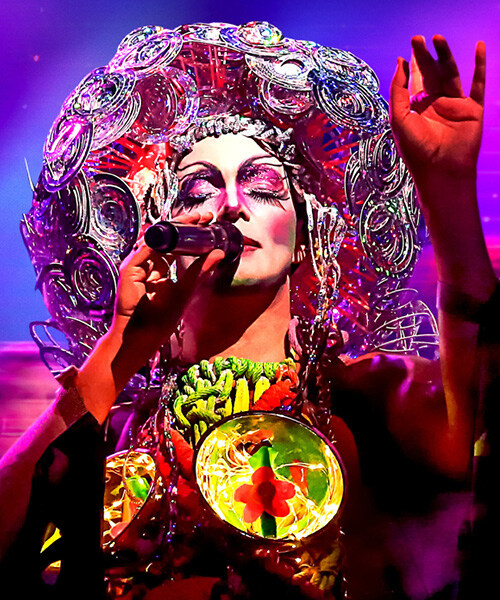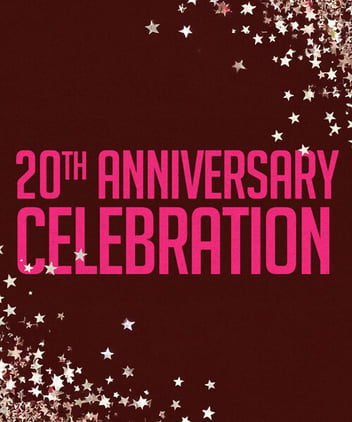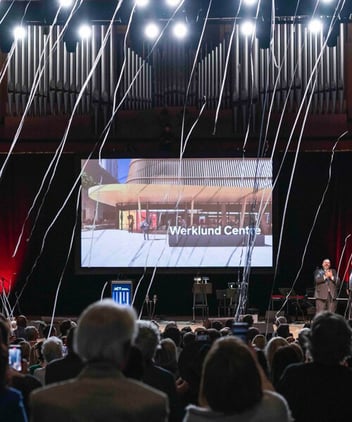

The Cultural Significance of Taylor Mac: A Visionary of Queer Performance and Radical Inclusion
Shone Thistle, Dec 17, 2024
Taylor Mac (who uses the pronoun ‘judy’) is a one-of-a-kind powerhouse in modern theater and performance art. Performance artists the world over look at Mac’s work as being nothing short of transformative. Experiencing judy’s artistry feels like being handed a glittering, multi-colored mirror—one that reflects not only queerness in all its vibrancy but also our shared humanity, histories, struggles and triumphs. Mac’s fearless commitment to queerness, community, and shaking up the status quo reminds me why art matters: to liberate, celebrate, and connect us to each other.
When I first encountered Taylor Mac’s work, I was struck by its audacity and beauty—a full-hearted embrace of spectacle, emotion, and queerness that felt deeply personal. Mac’s ability to challenge the status quo while fostering joy is awe inspiring. With Mac, theater isn’t just art; it’s a living, breathing act of resistance, reclamation, and love.
A playwright, singer, actor, drag artist, and all-around creative disruptor, Mac has redefined what theater can look like and who it’s for. Judy’s work goes beyond entertainment—it explores identity, history, and the power of resilience. From the marathon A 24-Decade History of Popular Music to groundbreaking plays like Hir, Taylor Mac opens new, vital spaces in the arts for stories that have been overlooked for far too long.

Reclaiming History—One Song at a Time
If there’s one work that defines Taylor Mac, it’s A 24-Decade History of Popular Music. This epic 24-hour performance traces 240 years of American history through popular songs, storytelling, and spectacle. But Mac doesn’t just perform the songs — judy reimagines them, reclaiming history by amplifying the voices of people often left out of the story. Think women, Queer folks, people of color, and other communities pushed to the margins.
What’s even more special is how Mac turns audience members into part of the performance; pulled into the action, sometimes literally, as the show transforms into a temporary, magical world where everyone belongs. It’s a history lesson, but not the kind you’ll find in textbooks—instead it’s one full of glitter, laughter, and a shared sense of possibility.
Celebrating Queerness in All Its Glory
Queerness is at the heart of everything Taylor Mac does—from the dazzling, otherworldly costumes (created by Machine Dazzle) to the way judy tells stories. Mac leans into drag, camp, and theatrical excess as tools for joy and liberation. Judy’s art challenges rigid ideas of gender and identity, creating space for fluidity, messiness, and self-invention.
Take Hir, one of Mac’s best-known plays. Hir flips the traditional family drama on its head, tackling gender creativity, family dysfunction, and shifting societal norms using a healthy dose of dark humor and raw honesty. By centering imperfect, transgressive, and resilient characters, Mac challenges audiences to see love, family, and identity through a completely new lens.
Making Art About Connection
For Taylor Mac, theater isn’t a solo act—it’s about community. Judy considers audience members as collaborators, not spectators, breaking down the usual wall between performer and viewer. By inviting people to engage, Mac transforms theater into a shared experience, where art becomes a tool for connection and collective joy.
This focus on community isn’t just about the stage. Both under stage lighting and in the light of day, Mac is a champion for marginalized artists and underrepresented voices, pushing for a more inclusive and creatively empowered world. How Mac moves through the world is an audacious reminder that art can heal, bring people together, and inspire meaningful change.
Recognition and Impact
Taylor Mac’s groundbreaking work has earned plenty of well-deserved praise. A 24-Decade History of Popular Music was a finalist for the Pulitzer Prize for Drama, and Mac has received honors like the MacArthur “Genius” Grant and the International Ibsen Award. Judy has also earned Obie Awards and even a Tony nomination for Gary: A Sequel to Titus Andronicus.
What’s more impressive than the awards, though, is how Mac’s work resonates with people. Audiences worldwide have been moved by judy’s ability to challenge norms and celebrate difference—a true testament to the power of radical art.
Canada’s Connection to Taylor Mac
Taylor Mac’s work isn’t just a U.S. phenomenon—it has also found a welcome home in Canada. In 2018, A 24-Decade History of Popular Music had its Canadian premiere at Toronto’s Luminato Festival, a major celebration of innovative and global arts. The show struck a deep chord with Canadian audiences, especially in its commitment to reimagining history through a queer and inclusive lens. In a country grappling with its own stories of identity and reconciliation, Mac’s work feels both timely and necessary.
Canadian arts festivals like Luminato have embraced Mac’s bold, boundary-pushing approach to performance, showing just how universal judy’s message of inclusion and connection really is.
A Legacy of Joyful Disruption
Taylor Mac’s work proves that art can be so much more than just entertainment—it can challenge us, inspire us, and bring us together. Judy’s performances invite us to rethink history, question societal norms, and embrace queerness in all its vibrant, messy, and beautiful forms.
In a world where exclusion and division still loom large, Taylor Mac reminds us of art’s incredible power to heal, connect, and transform. By pushing boundaries and celebrating community, Mac’s legacy will undoubtedly inspire generations of artists and audiences to come.
Experience the connective tissue, magic and joyful disruption of Taylor Mac first hand! On January 18th, attend a riveting behind-the-scenes discussion with Taylor Mac hosted by One Yellow Rabbit’s own Denise Clarke. Then stick around for a complementary film screening of 24-Decade History of Popular Music in the Martha Cohen Theatre at Arts Commons.
Shone Thistle
Shone Thistle is a Queer poet and multidisciplinary artist. Once described as a “feminist folk poet,” Shone’s poetry credits range from radio to jazz concerts, festivals to conferences. Shone played an integral role in brokering Calgary’s first permanent Pride and Trans crosswalks and was an active voice in the establishment of Canada’s strongest municipal bylaw against conversion therapy. Her superpower is taking disparate content and weaving it into a cohesive story.



